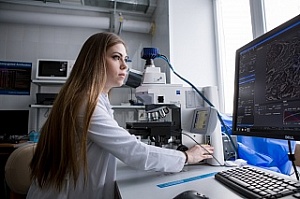TSU staff, with colleagues from Tomsk National Research Medical Center (TNIMC), are studying the role of chronic inflammation in the formation and development of cancer and heart attacks. The new research will help to develop a personalized approach to prescribing treatment that will increase the survival rate of cancer and heart attack patients.
- The main object of the study is macrophages, which are cells of innate immunity and play an important role in the adequate response of the body to any invasion, like their predecessors, monocytes, - says Irina Larionova, the project executor, a junior researcher at the TSU Laboratory for Translational Cell and Molecular Biomedicine, junior researcher at the Oncology Research Institute of Tomsk Scientific Research Center. - In cancer, tumor-associated macrophages work on the tumor, contributing to its development and metastasis. It turned out that macrophages are able to program (change their properties) under the influence of antitumor treatment (chemotherapy and radiotherapy) and contribute to the effectiveness of therapy. The specific programming mechanism is still unknown. Part of the project’s research focuses on how monocytes and macrophages can change their functional status in response to chemotherapy.
Today scientists pay great attention to tumor heterogeneity. Tumors are diverse in their genetic status, morphological structure, ability to metastasize, and other parameters; therefore, programming mechanisms will have diverse characteristics in different patients. Depending on the microenvironmental conditions, macrophages can have an antitumor effect or help the tumor to adapt and develop.
The results of the research at TSU and TNIMC will be used to develop new molecular markers for monitoring and prognosis of the disease and also will help to identify targets for a personalized approach to choosing chemotherapy and immunotherapy and increase the effectiveness of treatment.
- The second bloc of the project is devoted to studying the role of macrophages in the development of the inflammatory processes accompanying heart attacks, - says Irina Larionova. - Scientists plan to obtain new data on the phenotypes of immune cells and the features of their changes in the coronary arteries at different stages of a heart attack. The mechanism of inflammation in the atherosclerotic plaque will also be investigated. This will help find new therapeutic approaches for the effective treatment of patients after myocardial infarction.
Another bloc of research is on the body's response to the introduction of implants with biocompatible coatings to restore postoperative tissue defects or injuries from trauma. The response is through the immune system, including macrophages, and it is necessary to achieve conditions for the integration of the implant into the tissue so that there is no rejection. New information will help in the manufacture of coatings with special anti-inflammatory properties that reduce the risk of implant rejection.

